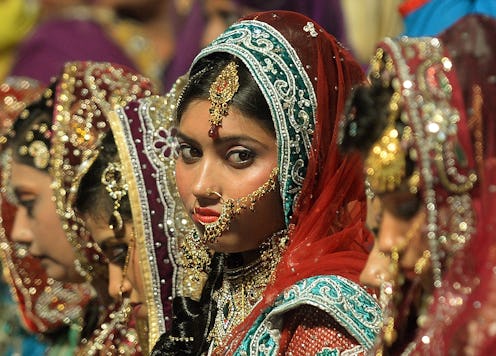News
India Rules "Instant Divorce" Unconstitutional & It's A Remarkable Victory For Women

On Tuesday, India's Supreme Court ruled the controversial Muslim practice of "instant divorce" unconstitutional in India, something which women's rights advocates and organizations have been fighting to achieve for years. With its new ban on "instant divorce," India now joins many other countries that had already banned the practice due to its detrimental impacts on women.
The Muslim practice of instant divorce is known as "talaq-ul-bidat" or "triple talaq." Triple talaq allows a man to instantly divorce his wife by uttering the word "talaq" three times, either verbally or in writing. Indeed, many more recent cases of triple talaq in India over the past few years have involved men divorcing their wives through letters, WhatsApp messages, or Skype. Triple talaq can be invoked by men at any time against their wives, but women cannot invoke triple talaq against their husbands.
Tripe talaq can lead, and has led, to many negative consequences for women who are unexpectedly and unceremoniously divorced from their husbands with the quick utterance of three words. As an article in India Today pointed out earlier this year, the practice perpetuates vast insecurity for women, who must live in fear that their marriage could be dissolved at any moment, and, if it is dissolved, they could face stigmatization as well as extreme impoverishment if they are forced out of their marital home.
In ruling triple talaq unconstitutional in India, the majority opinion found that the practice is "not integral to religious practice and violates constitutional morality". This stance is one that is supported by India's Prime Minister, Narendra Modi, who has backed the women petitioners in the court case and, according to NDTV, has repeatedly referred to the practice as "derogatory and discriminatory for women."
Part of the Supreme's Court's ruling included a directive for Parliament to enact a law on the practice of triple talaq within the next six months, something which many members of the public will likely be anxiously awaiting. If the law does not come into effect within that time frame, however, the Supreme Court injunction on the practice will remain in place.
Women's rights advocates as well as women and their families who have experienced the detrimental impact of being on the receiving end of a triple talaq divorce are likely celebrating the outcome of the court's ruling. In interviews conducted for Sky News prior to announcement of the court's findings, Iqbal, a northern Indian man whose daughter had received a triple talaq from her husband, reflected on the perils of the practice, saying,
This practice [triple talaq] is not in the Quran, it's an unjust unholy practice and destroys the life of a woman and her family.
Moreover, Nishat Hussain, a community leader who has dedicated herself to fighting triple talaq, stated to Sky News,
We have fought against everyone for years and our last hope is the highest court ... A woman's life is doomed within a few seconds with this practice.
Hopefully with the announcement of the Supreme Court ruling, advocates as well as those who have experienced the harmful effects of a triple talaq divorce can find comfort and hope. Moreover, married Indian women now no longer have to fear that their marriage could be dissolved at a moment's notice.